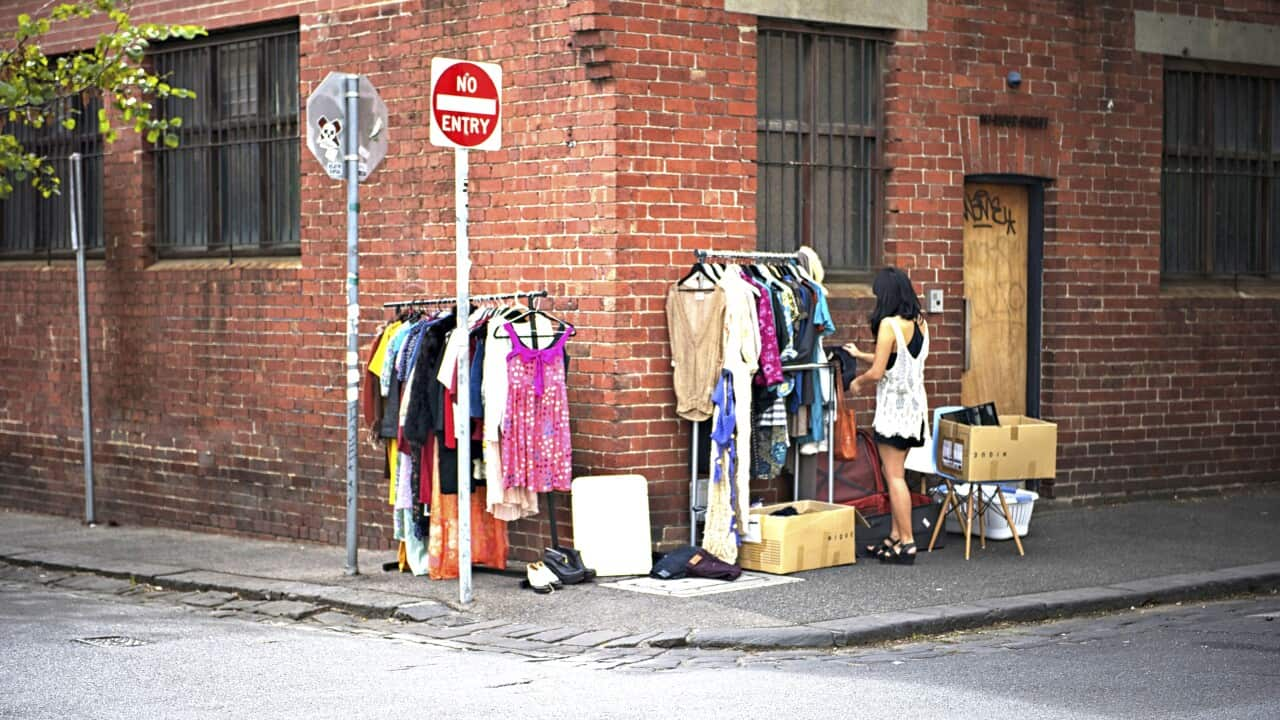Key Points
- Over 15,000 households in Australia will organise weekend garage sales this month.
- It's part of a nationwide initiative to educate people about the importance of re-using and recycling.
- Australia's younger generations are embracing the circular economy, Garage Sale Trail and PayPal data indicates.
An idea born from two friends in Sydney's eastern suburbs has now turned into a nationwide event to promote a more sustainable way to shop and get rid of unwanted household items.
With the support of over 80 local councils, over 15,000 households and half a million people across Australia are expected to take part in the Garage Sale Trail initiative on 9-10 November and 16-17 November.
Organisers say the events won't only provide sellers an opportunity to make some cash and get rid of unwanted items, but also demonstrate the environmental benefits of recycling used goods.
Who says garage sales aren't popular?
Although some may consider garage sales a relic of the past — now replaced by online marketplaces — they're making a strong comeback, with at least 14,000 held in Australia last year.
Data provided by Garage Sale Trail indicates that nearly 420,000 Australian buyers and sellers participated in garage sales in 2023, saving around 4.8 million kg of goods from landfill.
Around $3.6 million was generated from these sales, providing sellers some relief from the rising cost of living.
Pre-loved items such as books, DVDs, gardening equipment and clothes are among the most common items traded at garage sales.

"Garage Sale Trail is a not-for-profit social enterprise and was founded by two Sydney friends, Darryl Nichols and Andrew Valder," she told SBS News.
"The whole goal was to educate Australians on the importance of re-using and recycling and the need to take responsibility for the impact and our consumption habits."
The multiple benefits of buying second-hand items
A recent survey from Garage Sale Trail and PayPal revealed that 83 per cent of respondents would rather sell used, unwanted goods than throw them out.
Garage Sale Trail finance ambassador Molly Benjamin said buying and selling second-hand is a win for both your wallet and the environment.
"When you sell pre-loved items, you're turning things you no longer need into extra cash. On average, sellers on the Garage Sale Trail make $457, which can go a long way toward bills, savings, or that next big purchase," she said.
"Plus, it's a chance to de-clutter and give your items a second life, rather than letting them gather dust or end up in landfill."
Freelance journalist Melissa Matheson — who's taking part in a Penrith garage sale this weekend — says young people are leading the way when it comes to adopting less wasteful consumption habits.
"They're really dragging the rest of us along, which is great," she told SBS News.
"They've made it fun and something to sort of aspire to, rather than, you know, when I was a teenager, you went to op-shops for either army service things, for cargo pants, or you went to buy a costume for a fancy-dress party."
"So, they've really changed the conversation around second-hand garments, and, I think, all credit to them.
"They're really encouraging the rest of us to do better with our shopping."
With the holiday season just around the corner, Matheson says the Garage Sale Trail could provide some much-needed cost of living relief.
"The Garage Sale Trail's a really good opportunity to maybe pass on some of the books, maybe DVDs that you don't use anymore, kids' toys," she said.

"If it's second-hand that's in perfect condition, that's a really good opportunity for people to get some Christmas gifts that are not going to really blow the budget but are also going to be quite [environmentally friendly]."
Environmental groups, such as the Waste Management and Resource Recovery Association of Australia, say this type of community action should have more support.
"I just think the Garage Sale Trail mindset initiative is a terrific process to couple with your council cleanups because not everyone in the cost of living crisis can afford to buy new," the association's CEO Gayle Sloan told SBS News.
"It's a great way to keep products circulating and help others, and help yourself, to get access to products rather than throwing it into landfill, so it should be supported."

A garage sale in Bondi, Sydney. Credit: Oliver Strewe/Getty Images
Why is buying new clothes bad for the environment?
Data from the Australian Fashion Council shows Australian consumers purchase 15kg, or 56 new items, of clothing per year — 84 per cent of which ends up in landfill.
Sloan says re-using goods helps preserve natural resources that would otherwise be used to produce new items
"By using less for longer, we're not actually buying other products,” she said.
"Because we know that buying other products often means using more virgin material and 80 per cent of emissions come from [the] extraction of virgin material. So, we're using less.”
"That's why we've actually got to look at different ownership models. Sometimes it's re-use, sometimes it's shared, sometimes it's leased.
"So, we're not actually taking more materials out of the planet to buy new. So, we should keep materials circulating for as long as we possibly can."










